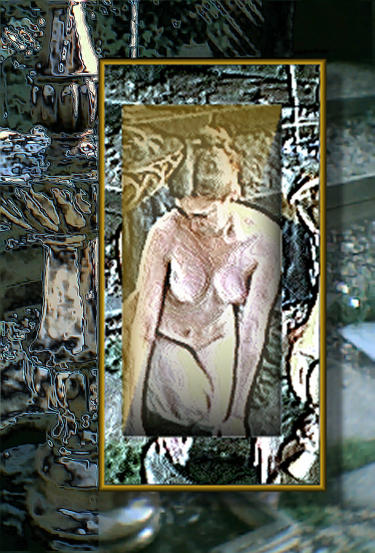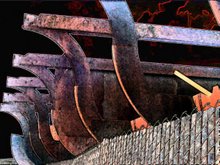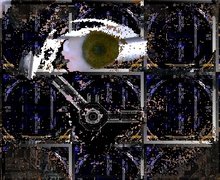
Expressionism was an attempt to make manifest inner motivation into the outside world. Psychological, subconscious motivation, more than any external happenings, is the source of drama.
This is the reason that Lulu, at the end of Pabst’s Pandora’s Box, is killed by Jack the Ripper. To an 18th Century critic fed on the philosophy of Enlightenment, the story wouldn’t make sense. To him, for no reason at all, the heroine is killed by some character who suddenly appears at the end of the story, whose only purpose is apparently to quickly bring the drama to an abrupt and arbitrary close.
To an Expressionist, though, it makes every bit of sense. As Louise Brooks, who so masterfully portrayed Lulu, said of her character, “It is Christmas Eve, and she is about to receive the gift that has been her dream since childhood: death by a sexual maniac.” In true Expressionist style, the maniac emerges from the foggy gas-lit darkness to fulfill her subconscious desire and her destiny.
It makes sense.
Kafka, of course, was the darling of the Expressionists but one may easily site Tolstoy as the grandfather of the movement. It was Tolstoy whose dynamic observations and keen psychological insights inspired Expressionism. Tolstoy was Freud’s favorite author.
In the early 20th Century there were other art movements with their own attendant philosophies. These philosophies each sought to give meaning to a world that seemed to be becoming chaotic or to, at least, underline the seriousness of the state of things.
The Naturalists presented life as it appeared to be. In a play, a man may go to the bathroom sink, shave, then go into the next room and put his shoes on and leave. In earlier plays this wouldn’t happen. Too boring.
But the Naturalists saw in this realistic (even mundane) portrayal a truth. Perhaps even seeing the character going through a ritual of grooming and girding himself for what comes next. The apparently insignificant (again a nod to psychology) has hidden meaning.
The Objectivists sought to distance themselves from drama. Or, more accurately, to present the material and let the audience supply their own emotional investment without recourse to artificiality. Stravinsky was speaking as an arch Objectivist when he said, “Music can express nothing…. It expresses itself, which it does eloquently.”
As Barry Paris wrote in his excellent biography of Louise Brooks, the New Objectivity (Neue Sachlichkeit) was a “…movement…developing in reaction to Expressionism. Disillusionment was its emotional source, and indifference its attitude…. That indifferent attitude stemmed from the corruption and apparent meaninglessness of European life between the world wars.” It is safe to say, though, that this nihilism had another, even darker source.
Consider that these artistic movements were not insignificant. In the 18th and early 19th Century, philosophy had, with some noteworthy exceptions, the quality of a parlor game. But by the 20th there was a desperate earnestness to philosophy.
These artists of the Teens and Roaring 20s were seeking a means by which society, even civilization itself, might survive. For the 20th Century had begun with a bang.
***
The First World War was a cataclysm. It was a “dirty” war, without clear objectives, motivated by politics and fought on an immense scale. It was hard to be Romantic about it (unless one were, maybe, a pilot). Soldiers trudged through mud, lived in trenches, were gassed, machine-gunned, bombed, incinerated, caught on the wire and left to rot or died of disease. The civilian populace itself was targeted. And this war, or something very near like it, was expected.
Numerous writers of the 19th Century warned of it. The most brilliant, like Wells, were able to prognosticate in great detail. Many anticipated the 20th Century to be a period of intense change, severe mechanization and unparalleled violence. Significantly, Richard Strauss subtitled his tone poem, Also Sprach Zarathrustra (Thus Spoke Zarathruustra, about the ancient philosopher Zoeraster, who after spending 30 years living with the eagle and the bear, surviving and contemplating, awoke one morning and greeted the rising sun. And the sun said to him to go down. Down to the villages and speak to his fellow men and tell them of the things he had learned), “Symphonic Optimism for the 20th Century.” Tellingly, the piece does not end on a happy note.
A Hungarian word, robotnic, meaning, “slave,” began to have import. The Robot was seen as a symbol of the coming age. It was the slave, the servant and also the dehumanizing machine and New Adam. The Robot and later the Airplane were symbols of the Future. And often in the 19th Century mind this was a dystopian future. A future of gigantic warfare and Millennialism.
It is a pity that Victoria, who died in the very first year of the 20th Century, (as befitting the end of her era) was not a better queen. In her reign the sun truly did not set on the British Empire. England was the superpower. Yet, for all its wealth and might, it was full of the impoverished. And despite the warnings of her writers and best intelligencia, the Great War loomed.
Had these forewarnings been heeded and had there at least been a more decent social consciousness, the whole shape of the 20th Century would have been different. The Serbian problem would have been taken care of. And even if it hadn’t, the political state could have been engineered so that the assassination of the Arch Duke Ferdinand would merely have been an item in the paper, of no world-shattering importance.
But this is not what happened. The warnings were ignored with a charming sort of blithe hope-for-the-best Positivist attitude. The expected war happened. And from it an experiment in Utopian Realism made manifest in violence, the 1917 Revolution. And also from The Great War: The Armenian Genocide, World War II, The Holocaust, The Long March, the Viet Nam War, the Cold War. The Atom Bomb.
We’ve been fighting the Great War continuously.
***
Romanticism was a philosophy prevalent in the 19th Century. It said, among other things, that our emotions matter. One isn’t angry for no reason; there must be something to be angry about. It was a series of ideas that actually gave legitimacy to emotion in a way that Enlightenment never did.
The artistic movements of the early part of the 20th Century carried on the personal gestalt of Romanticism into the mechanized age. But whereas the Romantics focused on color, Eros, heroism and beauty, the art movements of the 20th Century generally reflected the mystery of the subconscious and the dark, black dissonant recesses of the human soul.
The 20s were a kind of reaction against the hideousness of the war years. People tried to find beauty once again, but more usually degenerated into a dazzling debauched decadence without any purpose except escape.
The Great War had been fought with weak leadership, often corrupt industrialists and, as previously mentioned, no clear goals. Could the attitudes or even artistic color of the 1920s been any different? The chroma of 20th Century (and now 21st Century) art was set.
And because of the lack of solid objectives the conclusion of World War I was, in reality, no conclusion at all. The unfinished business would be picked up time and time again and the conflict would be waged in every part of the world, claiming billions of lives and shaping every significant social, philosophical and artistic movement.
In Tempor Bellum January 20th, 2007














